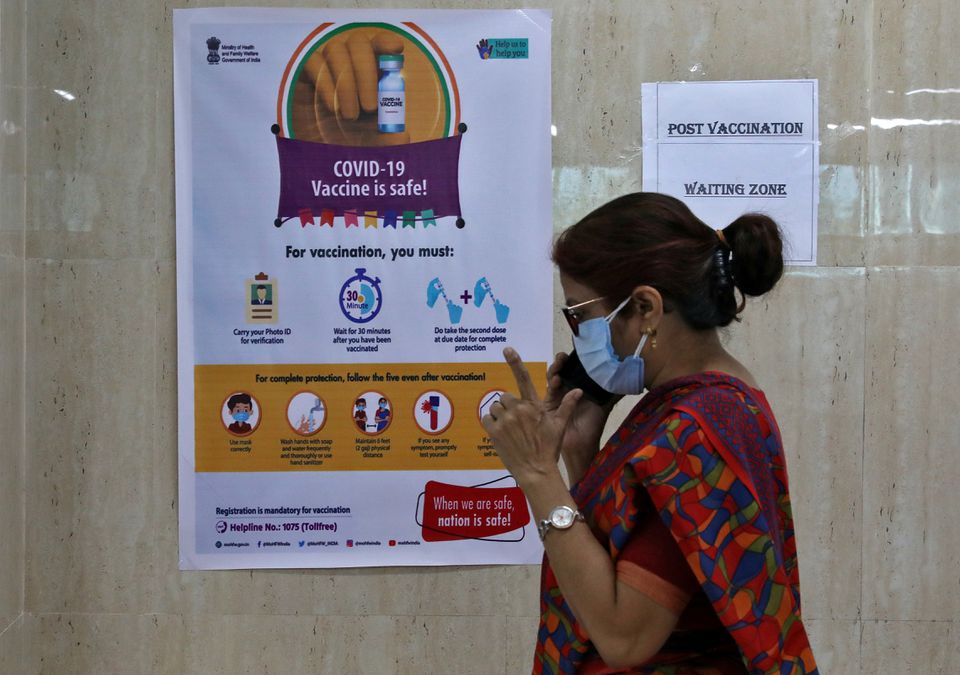# Indian state governments stop vaccination after Moderna and Pfizer refuse to send its vaccines directly to states;
# Delhi is forced to lodge orders, but health secretary says other countries are ahead in the queue to order vaccines.
(AF) State governments in India were put in a fix and forced to stop vaccinations after US pharmaceutical giants Pfizer and Moderna turned down requests from New Delhi and Punjab to supply vaccines directly to them. The companies said they would only deal with the central government, and not individual states.
That meant vaccination programmes in Delhi and Punjab had to shut for people aged below 45 years due to non-availability of doses, the two governments said on Monday.
Other state governments, such as Andhra Pradesh and Maharashtra, said they were also trying to source vaccines from global suppliers, but admitted they were also struggling to cope with insufficient supplies to inoculate people aged between 18 and 44.
New Delhi “liberalised” its vaccination policy last month by allowing states to procure vaccine doses directly from manufacturers. The move prompted many states to float global tenders to procure vaccines from international firms.
The Punjab reached out to “all vaccine manufacturers” – such as Sputnik V, Pfizer, Moderna, and Johnson and Johnson – to directly source supplies. It is still hoping for a positive response from Sputnik V and Johnson & Johnson, according to the state’s vaccination officer.
New Delhi’s U-turn
Despite being the largest vaccine-producing nation, India has been scrambling to vaccinate its 1.35 billion people ever since the furious second wave started in late March. More than 300,000 are recorded as dying of the coronavirus since then, although the real death toll could be up to 10 times higher, given the shortcomings in statistics kept by most local and regional officials.
Weekly vaccinations, according to government numbers, have fallen from a peak of nearly 25 million doses in early April to about 9 million in May, although the government has pledged to make 2.67 billion doses available this year.
But reports say, while the two main vaccine makers – Serum Institute of India and Bharat Biotech Ltd – have been producing 80 million doses – of CoviShield and Covaxin – per month, up until the third week of May the country had only managed to fully vaccinate about 50 million of its people.
The national health ministry, which has been rocked by the crisis, said on Monday it had stepped in to talk directly with global vaccine makers to facilitate regulatory clearance and procurement of doses.
The U-turn came after the government declined to recommend emergency use authorisation for Pfizer’s mRNA vaccine in February.
“We are coordinating at the central level with vaccine makers. The order books of both Pfizer and Moderna are full most of the time. Depending on the surplus available with them, they will get back to the government of India,” Health Secretary Lav Agarwal told a press conference.
The ministry also said that it would not enforce the condition of phase 2 and 3 clinical trials in the country for vaccines that had been cleared by the US, EU, UK and Japanese regulators, and those listed by the WHO.
Agarwal said the government would ensure and facilitate supplies of vaccines at state level, based on how much they can supply to India.
He said several other countries were far ahead of India in the queue, waiting for delivery of confirmed orders, and the two American companies, which began supplying vaccines last year are committed to deliver to them first.
More local vaccines
India – which already produces Covishield, Covaxin, and the Russian Sputnik V – is slated to get a fourth vaccine from July, after drugmaker Cadila Healthcare said on Monday it is tripling production of its Covid vaccine ZyCoV-D to 30 million doses a month.
ZyCoV-D is a DNA plasmid vaccine, which uses a portion of the genetic code – DNA or RNA – in the virus to stimulate an immune response. The vaccine is undergoing late-stage trials in nearly 30,000 adults after being found safe and immunogenic in earlier studies.
The company said it is meant to be given in three doses but Cadila is also doing trials on a two-dose regimen.
Meanwhile, the deadly second wave may be showing signs of peak, as Monday’s daily new cases fell below the 200,000 mark for the first time in 40 days.
Daily recoveries have outnumbered daily new cases for 12 consecutive days, while 326,850 people were said to have recovered in the last 24 hours.
“With a total of 2,058,112 tests conducted in the last 24 hours, the daily positivity rate has reduced and now stands at 9.54%,” the health ministry said.
With reporting by Reuters.
























